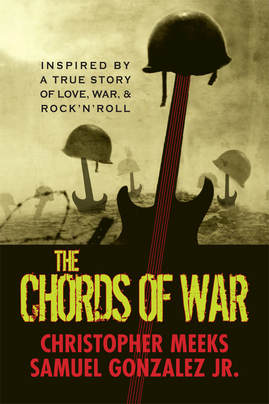 Many weeks ago, before my war novel, The Chords of War, was published, I was interviewed by blogger Justin Oldham, and so was my co-author, Sam Gonzalez. Mr. Oldham asked good questions, and then I forgot about the interview. Recently, his blog came out that gives deep insight into the novel, America's wars, and novel writing. Here is his piece with a link to his site: The Chords of War By Justin Oldham The Chords of War by Christopher Meeks and Samuel Gonzalez, Jr., is a story of 21st Century self-discovery that takes the reader through the pain of personal growth, into the horrors of war, before it arrives at wisdom. This fast read has a basis in reality that is sincere enough to make you think. Ideal for anyone who doesn’t quite know who they really are just yet or what they want to do in the future. Portions are reminiscent of post-Vietnam fiction. I submitted questions for the author and his source of inspiration. Samuel Gonzalez Jr. is a filmmaker and songwriter. The character of Max Rivera is the name of his fictional counterpart, who stands in for him throughout the novel. Max experiences the tragedy of September 11th (2001) at nearly the same time he's kicked out of the rock band he wanted so much to be a part of. What you read in these pages is more than a search for identity; it's a literary portrait of millennial uncertainty. Like so many young men before him, Max chooses to enlist in the U.S. Army for a dose of discipline. The estrangement from his friends and sudden derailment of his musical aspirations after many loud and hurtful arguments is presented as flashbacks, while the story moves forward through fog of war as it is now perceived by today's youth. For anyone who can remember the 1970s, this story strikes a familiar "chord" because it reads like the recollections of a Vietnam veteran. Vietnam-era fiction emphasized just as many patriotic themes as are represented here. Readers are given a sense of the uncertainty that was so common for millennials immediately after the gruesome televised destruction of the World Trade Center. Anyone born after 1980 has a hard time comprehending the scope and scale of the Cold War (1947-1991). The Chords of War is a testament to the shock and surprise felt by the millennial generation, much like our grandparents endured when Imperial Japan attacked Pearl Harbor. What begins with rejection by people Max thought of as friends later becomes a departure from people and places he didn’t really fit into. As much as Max loves his country, he has a hard time finding his place in it. Being an MP (military policeman) during the Iraq War feels like Vietnam-era fiction because chapters present flashbacks to what led Max to join the Army. Music plays its own part in the unfolding story. It’s a personal refuge for Max that also serves to inspire him while he adapts to structured military life in a chaotic war zone. His discovery of Vietnam-themed films like Apocalypse Now and Full Metal Jacket underscores the fact that he, and the author who created him, are all too are of the similarities. I asked Christopher Meeks: Do you share Max Rivera’s taste in music or literature? His reply explains why you’re now able to read this story. “This question makes me smile because in writing the book, I had to imagine I was Max who was mostly Sam. While I love music and knew some of the music Sam did in 2005-2007, I also came to see that Sam as a musician loved and even played some of the classic rock I grew up with. Thus, some of the older music is what I loved, too. Sam suggested many of the bands in this book, and then I’d go into Amazon and YouTube and listen to these bands until I found songs I really liked, and then I’d run them past Sam. What he liked of my choices went in. At other times, Sam simply said exactly what they played at a certain time in their Humvee." Ever since consumers could walk about with a music player of some kind, we have thought of life in terms of music. Anyone who likes the history of music will appreciate how references to specific tunes provide flavor to the chapters they occur in. Meeks explained why music mattered. “Sam is a filmmaker. Like me, he builds stories in scenes. I sensed he was always thinking of the soundtrack to this book if it were a movie.” The pointlessness of modern war has been in the minds of writers and movie makers since the Korean War. The Chords of War does more than portray what are now all-too-common consequences of failed foreign policy. The first-person perspective allows a reader to understand why Max eventually returns to songwriting and occasionally performing for the enjoyment of his comrades. It’s part of that discipline and purpose he looks for. To read the rest of Oldham's fabulous piece, please click here. A piece I wrote about Vietnam and Iraq can be read on another website. Click here for that piece.
1 Comment
|
AuthorBefore I wrote novels and plays, I was a journalist and reviewer (plays and books). I blogged on Red Room for five years before moving here. CategoriesArchives
July 2023
|
 RSS Feed
RSS Feed
